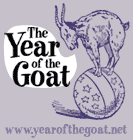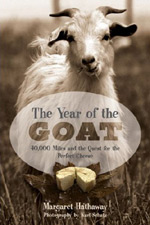 |
| Parents and their children enjoy a beautiful spring day and a pen full of pregnant does at Haystack Mountain Dairy in Niwot, Colorado. Every Tuesday and Saturday the dairy, located just north of Boulder, is open to the public. | more photos from Haystack Mountain Dairy |
In the spring of 2003, when Karl and I were first beginning to investigate the world of goats, an internet search led us to the web site of
Haystack Mountain Dairy, a farm and cheese operation just outside of Boulder, Colorado. Like us, Jim Schott and his family had become interested in goats while leading respectable city lives. Like us, their enthusiasm seemed equally balanced between the animals themselves and the myriad possibilities for the milk they produced. They had even done work volunteering at a small dairy in South Africa, a country Karl and I had just visited. Everything we read seemed like a cosmic sign, a further confirmation that we were on the right track. Discovering Haystack Mountain Dairy was one of the firm nudges that edged us out of New York and onto the road.
A year later, much has changed, both in our lives and, we learned when we visited, at Haystack Mountain Dairy. Though Jim began more than a decade ago to create cheeses made from the milk of goats raised on his property, the combination of his cheese's popularity and his entrepreneurial efforts has created a demand that outstrips current production capabilities. In response, the operation has expanded, contracting with another small goat dairy for supplemental milk and building a new facility for the production of their fresh cheeses (aged ones will continue to be made in the existing space).
While this growth is welcome and exciting, it's important to Jim that the dairy remain human scaled, both for quality control and to fulfill their mission of community outreach. Twice weekly, on Tuesday and Saturday mornings, the farm opens its gates and invites visitors to make the brief journey to the base of Haystack Mountain, where a tree-lined drive marks the path to a cluster of barns and outbuildings. Everyone in the Boulder area seems to know about these open houses, and on the Tuesday we visited, there was cheerful chaos as mothers and young children flitted between cheese samples, bottle feedings, and vigilant observation of the doe pen that had, earlier in the morning, produced a set of triplets. One woman we spoke with said that she and her kids had been to the farm several times, while another, who was buying a bar of goat milk soap and two logs of chevre, said it was her first visit, but she'd be back. Amy, the farm's herd manager, alternated between making change and answering questions about the animals.
Before he bought the dairy, Jim was an educator, and the educational component of the farm is a nice link between his past life and his present. His South African volunteer work, as well, has given him the opportunity to share his experiences and teach others about cheese making while continuing to devote himself full time to the dairy, which, in the busy-ness of expansion, increasingly needs his attention.
On the day we visited, Jim made time between the weekly staff meeting and the delivery of some new equipment to sit down with us around his kitchen table and talk about his love of farming. A soft-spoken man, Jim said that no one farms for the money, rather it's the appeal of a lifestyle, an appreciation of the moments of calm while embracing those that are hectic. Above all, it's a love of animals.
Posing for a portrait with Chief, his Saanen buck, Jim's affection for his goats was evident. Despite the expansion and the growing acclaim, maintaining a relationship with the animals, and an intimacy about the entire dairy, is key to Jim's approach. The farm is his home, as well as his business, and he sees the dairy as a kind of family. Leaning into a nuzzle as though the buck were whispering in his ear, Jim looked completely connected with his world, and perfectly content. —MMH




